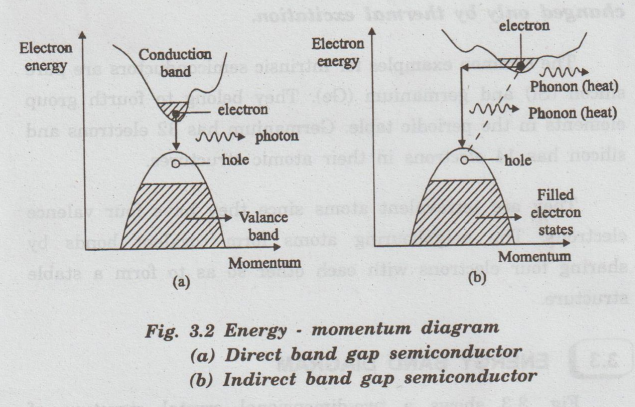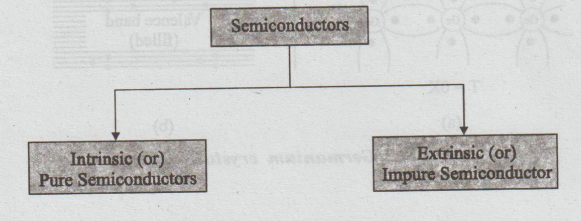Physics for Electrical Engineering: Unit III: Semiconductors and Transport Physics
Direct and indirect band gap semiconductors
Types of Semiconductors
Semiconductors are also classified into (a) Direct band gap semiconductor (b) Indirect band gap semiconductor
DIRECT AND INDIRECT BAND GAP SEMICONDUCTORS
Semiconductors
are also classified into
(a)
Direct band gap semiconductor
(b)
Indirect band gap semiconductor.

The
electrons and holes in a semiconductor have energy and momentum. The momentum
(k) depends on energy (E). A plot of energy versus momentum is as shown in fig.
3.2

The
lower curves represent energy and momentum values of holes in valence band of
semiconductor. Similarly upper curves denote corresponding values for electrons
in conduction band.
In
direct band gap semiconductor, the energy maximum of valence band and the
energy minimum of the conduction band are having same momentum value.
During
the recombination of electron from conduction band with hole in valence band,
the momentum of the electrons remains virtually constant. The energy equal to
band gap energy is released as light photon.
But,
in the case of indirect band gap semiconductor, the maximum energy of valence
band and minimum energy of conduction band are having different values of
momentum.
During
recombination, electron first loses momentum such that it has momentum equal to
the momentum corresponding to energy maximum of valence band.
To
conserve the momentum, emission of third particle known as a phonon is
generated. Thus, in this type of recombination phonon is produced.
Types of Semiconductors
When
a suitable impurity is added to a pure semiconductor, its electrical
conductivity changes. Based on this property, the semiconductors are classified
into two types. They are
(i)
Intrinsic semiconductor or pure semiconductor
(ii)
Extrinsic semiconductor or impure semiconductor or Doped semiconductor

Physics for Electrical Engineering: Unit III: Semiconductors and Transport Physics : Tag: : Types of Semiconductors - Direct and indirect band gap semiconductors
Related Topics
Related Subjects
Physics for Electrical Engineering
PH3202 2nd Semester 2021 Regulation | 2nd Semester EEE Dept 2021 Regulation
